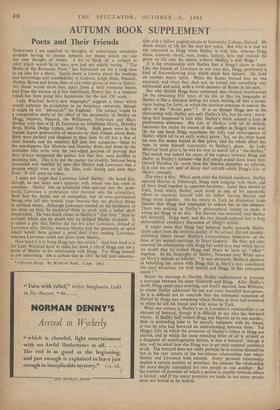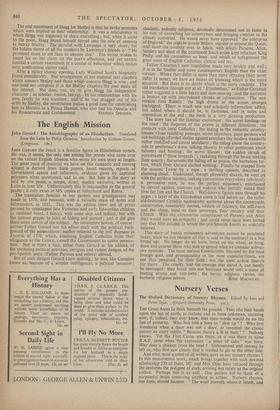AUTUMN BOOK SUPPLEMENT
Poets and Their Friends
SOMETIMES I am appalled by thoughts of unfortunate university students having to choose subjects for theses which no one has ever thought of before. I try to think of a subject to offer which would be at once new and not utterly boring. "The Debts of the Romantic Poets" has fascinated me for a long time as an idea for a thesis. Surely more is known about the lendings and borrowings and indebtedness of Godwin, Leigh Hunt, Peacock, Shelley, Byron and Keats, than of any other group of men in history. My thesis would show that, apart from a brief romantic boom, and from the success of a few individuals, Poetry Inc. is a business which has been going into liquidation for the last 150 years.
Lady Winifred Scott's new biography* suggests a thesis which would certainly be acceptable in an American university, though it might be too " advanced " for England. The subject would be a comparative study of the effect of the personality of Shelley on Hogg, Medwin, Peacock, the Williamses, Trelawney and Mary Shelley, with that of D. H. Lawrence on Middleton Murry, Dorothy Brett, Mable Dodge Luhan, and Frieda. Both poets were to the highest degree provocative of memoirs by their friends about them. Both were derided and despised in their lives by all but a few of their friends, and the memoirs fall into two categories—those by the worshippers, like Medwin and Dorothy Brett, and those by the intimates who write with the two-edged purpose of proving that they always recognised the genius, but that they were justified in despising him. This is to put the matter too crudely, because being fascinated and repelled by men like Shelley and Lawrence was a process which went on all the time, both during and after their lives. It still goes on today.
I must not forget that Lawrence hated Shelley. He hated him, though, as one hates one's opposite with whom one has most in common. Shelley was an aristocrat who married into the prole- tariat, Lawrence a proletarian who married into the aristocracy. Both had the faults, not of sensualists, but of over-spiritualised beings who fall into sensual traps because they see physical things in spiritual terms. Although Lawrence insisted on the earthiness of his ideas on love, he anchored them to earth with a rather shrill desperation. He was much closer to Shelley's "free love" than he realised, which was no doubt why he disliked Shelley so much. It is rather a pity that Shelley did not live after Lawrence, instead of Lawrence after Shelley, because Shelley had the generosity of spirit which Would have gained a good deal from reading Lawrence, whereas Lawrence could not learn from Shelley. • How hard it is to bring Hogg into this article! And how hard it is for Lady Winifred Scott to make her book a life of Hogg and not a study of Shelley in his relationship with Hogg. For Hogg himself is not interesting. On a certain day in 1811 he fell into conversa- *Jefferson Hogg. By Winifred Scott. (Cape. 18s.)
tion with a fellow undergraduate at University College, Oxford. He drank deeply of life for the next few years. But why is it that we are interested in Hogg when Shelley is with him, whereas Hogg alone, however clever, wise, ironic, literary, firm and realistic his grasp on life may be, seems, without Shelley, a dull Hogg ?
It is the relationship with Shelley that is Hogg's claim to fame. Like the friends of Lawrence in our own day, Hogg performed a kind of fire-swallowing trick which made him famous. He lived on another man's spirit. When the flames burned him he was surprised, and when they died out, he turned into something very substantial and solid, with a vivid memory of flames in his past.
But why should Hogg have continued that Oxford conversation for the remaining fifty years of his life, so that his biography ot Shelley is like a dialogue lasting ten years, trailing off into a mono- logue lasting for forty, in which the survivor attempts to answer the spirit of the "divine poet " ? It is as though Hogg saw in his relationship with Shelley not only Shelley's life, but his own ; every- thing that happened to him after Shelley's death seemed a kind of posthumous existence. His Life of Shelley, with all its defects, fascinates the reader by reason of the conflict in Hogg's own soul. On the one hand Hogg repudiates the folly and extravagance of Shelley which led to an early watery grave ; but, on the other hand, his own life seems buried in that grave, and his whole effort has been to unite himself vicariously to Shelley's ghost. As Lady Winifred Scott puts it, he was for ever in search for a "she-Shelley." This search was indeed the cause of the rupture between Hogg and Shelley in Shelley's lifetime—the Fall which exiled them from their Oxford Paradise far more than the famdus pamphlet on atheism. It is also the soft spor of decay and untruth which Hogg's Life of Shelley conceals.
The story is this. When, soon after the Oxford expulsion, Shelley married Harriet in Edinburgh, Hogg took lodgings with them, and all three lived together in apparent harmony. Later they moved to York, from where Shelley went south in one of big spasmodic efforts to reconcile himself with his father, leaving Harriet and Hogg alone together. On his return to York he discovered from Harriet that Hogg had attempted to seduce her in his absence. There was nothing in Shelley's philosophical system to make it wrong for Hogg to do this. Yet Harriet was annoyed, and Shelley felt betrayed. Hogg went, and the two friends entered into a long philosophical epistolary discussion of Hogg's action.
It might seem that Hogg had behaved badly towards Shelley (quite apart from the intrinsic quality of the action), did not recently- published letters reveal Shelley's extraordinary behaviour at the time of his second marriage, to Mary Godwin. He then not only renewed his relationship with Hogg but acted in a way which leaves no doubt that he wished Hogg and Mary to have an " affair " together. In his biography of Shelley, Newman Ivey White sums up Mary's attitude as follows: "It was obviously Shelley's pleasure in beholding her union with Hogg that in Mary's eyes constituted the chief attraction, for both herself and Hogg, in this anticipated union I "
Before his marriage to Harriet, Shelley endeavoured to promote a marriage between his sister Elizabeth and Hogg. After Shelley's death, Hogg spent years courting, and finally married, Jane to whom Shelley addressed his last and most beautiful love-poems. So it is difficult not to conclude that the attempted seduction of Harriet by Hogg was something which Shelley at least half-connived in when he left his friend and wife alone in York.
What one notices in Shelley's as in Lawrence's relationships is an element of betrayal, though it is difficult to say who has betrayed whom. If Shelley half wished Hogg and Harriet on to one another, then in pretending later to be morally indignant with his friend, it was he who had betrayed an understanding between them. Yet Hogg's Life, in which the pronouns of Shelley's letters to Hogg are altered, and in which the most revealing letter of all is printed as a fragment of autobiographic fiction, is also a betrayal ; though it may well be asked how else Hogg was to get such material published at all. The betrayal does npt really perhaps lie in actions themselves but in the very nature of the too-intense relationships into which Shelley and Lawrence both entered. Every personal relationship implies a certain number of promises; the intenser the relationship the more •deeply committed are two people to one another. But the number of promises of which a person is capable towards others is limited ; and If too many promises are made to too many people some are bound to be broken.
The real resentment of Hogg for Shelley is that he broke promises which were implicit in their relationship. It was a relationship in which Hogg was supposed to share everything ; but, when it came to the point, Hogg found himself forced into the role of seeming to betray Shelley. The parallel with Lawrence is very close ; for the hidden theme of all the memoirs by Lawrence's friends is: "He promised more to me than to anyone else." The writer wishes to assert his or her claim on the poet's affections, and yet cannot conceal a certain resentment at a course of behaviour which makes only posthumous claims valid.
After a rather clumsy opening, Lady Winifred Scott's biography livens considerably. Her arrangement of her material into chapters which concern Shelley and those which concern Hogg is wise ; and one need not complain if in the Shelley chapters the poet steals all the interest. She does, too, try to give Hogg his independent character ; as scholar, ironist, lawyer. In his relationships with his own family he was excellent ; and if he was dragged out of his orbit by Shelley, she nevertheless makes a good case for establishing him as Horatio to a Prince Hamlet, who also had his Ophelia and
his Rosencrantz and Guildenstern. STEPHEN SPENDER.






















































 Previous page
Previous page